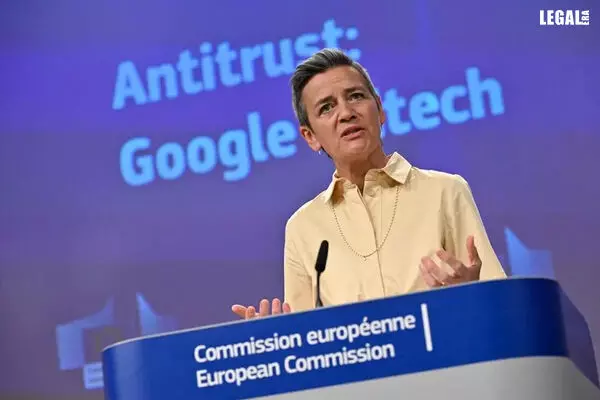- Home
- News
- Articles+
- Aerospace
- Agriculture
- Alternate Dispute Resolution
- Banking and Finance
- Bankruptcy
- Book Review
- Bribery & Corruption
- Commercial Litigation
- Competition Law
- Conference Reports
- Consumer Products
- Contract
- Corporate Governance
- Corporate Law
- Covid-19
- Cryptocurrency
- Cybersecurity
- Data Protection
- Defence
- Digital Economy
- E-commerce
- Employment Law
- Energy and Natural Resources
- Entertainment and Sports Law
- Environmental Law
- FDI
- Food and Beverage
- Health Care
- IBC Diaries
- Insurance Law
- Intellectual Property
- International Law
- Know the Law
- Labour Laws
- Litigation
- Litigation Funding
- Manufacturing
- Mergers & Acquisitions
- NFTs
- Privacy
- Private Equity
- Project Finance
- Real Estate
- Risk and Compliance
- Technology Media and Telecom
- Tributes
- Zoom In
- Take On Board
- In Focus
- Law & Policy and Regulation
- IP & Tech Era
- Viewpoint
- Arbitration & Mediation
- Tax
- Student Corner
- AI
- ESG
- Gaming
- Inclusion & Diversity
- Law Firms
- In-House
- Rankings
- E-Magazine
- Legal Era TV
- Events
- News
- Articles
- Aerospace
- Agriculture
- Alternate Dispute Resolution
- Banking and Finance
- Bankruptcy
- Book Review
- Bribery & Corruption
- Commercial Litigation
- Competition Law
- Conference Reports
- Consumer Products
- Contract
- Corporate Governance
- Corporate Law
- Covid-19
- Cryptocurrency
- Cybersecurity
- Data Protection
- Defence
- Digital Economy
- E-commerce
- Employment Law
- Energy and Natural Resources
- Entertainment and Sports Law
- Environmental Law
- FDI
- Food and Beverage
- Health Care
- IBC Diaries
- Insurance Law
- Intellectual Property
- International Law
- Know the Law
- Labour Laws
- Litigation
- Litigation Funding
- Manufacturing
- Mergers & Acquisitions
- NFTs
- Privacy
- Private Equity
- Project Finance
- Real Estate
- Risk and Compliance
- Technology Media and Telecom
- Tributes
- Zoom In
- Take On Board
- In Focus
- Law & Policy and Regulation
- IP & Tech Era
- Viewpoint
- Arbitration & Mediation
- Tax
- Student Corner
- AI
- ESG
- Gaming
- Inclusion & Diversity
- Law Firms
- In-House
- Rankings
- E-Magazine
- Legal Era TV
- Events
EU Antitrust Commission Sends Statement of Objections to Google over Abusive Practices in Online Advertising Technology

EU Antitrust Commission Sends Statement of Objections to Google over Abusive Practices in Online Advertising Technology
The European Union Antitrust Commission has informed Google of its preliminary view that the company breached EU antitrust rules by distorting competition in the advertising technology industry (‘adtech’).
The Commission raised issues concerning Google favoring its own online display advertising technology services to the detriment of competing providers of advertising technology services, advertisers, and online publishers.
Google, a US multinational technology company offers known for its flagship service search engine popularly known as Google Search.
Moreover, Google also operates on other popular services, such as the video streaming platform YouTube or the mobile operating system Android.
Google’s main source of revenue is online advertising, selling advertising space on its own websites and apps; and it intermediates between advertisers that want to place their ads online and publishers (i.e., third-party websites and apps) that can supply such space.
Google provides several adtech services that intermediate between advertisers and publishers in order to display ads on web sites or mobile apps.
It operates two ad buying tools – ‘Google Ads’ and ‘DV 360’; a publisher ad server- ‘DoubleClick for Publishers, or DFP’; and an ad exchange, ‘AdX.’
The Commission preliminary alleged Google to be dominant in the European Economic Area-wide markets since 2014 by:
(i) Favouring its own ad exchange AdX in the ad selection auction run by its dominant publisher ad server DFP by, for example, informing AdX in advance of the value of the best bid from competitors which it had to beat to win the auction.
(ii) Favouring its ad exchange AdX in the way its ad buying tools Google Ads and DV360 place bids on ad exchanges. For example, Google Ads was avoiding competing ad exchanges and mainly placing bids on AdX, thus making it the most attractive ad exchange.
The Commission raised concerned regarding Google's intentional conducts aimed at giving AdX a competitive advantage and may have foreclosed rival ad exchanges. This would have reinforced Google's AdX central role in the adtech supply chain and Google's ability to charge a high fee for its service.
In the event the said concerned is confirmed, such conducts would infringe Article 102 of the Treaty on the Functioning of the European Union (‘TFEU') that prohibits the abuse of a dominant market position.
Therefore, the Commissions is of the view that only the mandatory divestment by Google of part of its services would address its competition concerns and sending of a Statement of Objections does not prejudge the outcome of the investigation.



